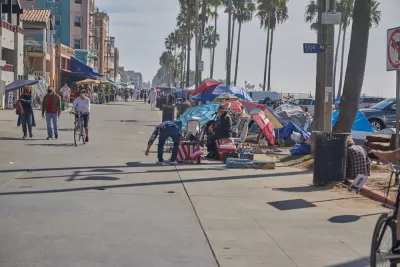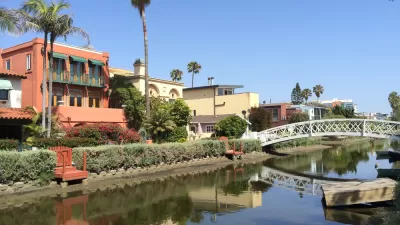The controversies about homelessness in what was once a beach community full of hippies and surfers has boiled over in response to a large proposed development of supportive housing on a surface parking lot owned by the city.

In June, Planetizen picked up news of an innovative new supportive housing project in Los Angeles. The project was designed by Eric Owen Moss Architects, a world renowned but locally based architecture firm, to bridge the Venice Canals and provide housing in one of the most affluent and historic parts of the city.
Fast forward to July, and Alissa Walker is reporting for Curbed about the less-than-favorable response for the project among local residents—in a neighborhood embroiled in an ongoing controversy involving City Council recalls and the county's controversial sheriff. A small group of local homeowners is planning to sue to stop the development, according to Walker, "hoping to contest the legality of a state law that allows affordable housing projects to skip environmental review."
According to Walker, opponents believe the project to be evidence of the city's plans to turn Venice into a "homeless containment zone." They would prefer a 43,000-square-foot, 600-space parking garage to be built on the lot instead.
Meanwhile, an estimated 2,000 people experiencing homelessness live on the streets of the neighborhood—the highest density homeless population outside of Skid Row adjacent to Downtown. The latest controversies about what to do about the large homeless population are detailed in the source article by Walker.
A separate article by Steven Sharp from May also provides details on the proposed project, including the latest renderings. Sharp first broke the news about the planned development in December 2018.
FULL STORY: Even a Starchitect’s Homeless Housing Project Won’t Sway Venice Beach NIMBYs

Planetizen Federal Action Tracker
A weekly monitor of how Trump’s orders and actions are impacting planners and planning in America.

Map: Where Senate Republicans Want to Sell Your Public Lands
For public land advocates, the Senate Republicans’ proposal to sell millions of acres of public land in the West is “the biggest fight of their careers.”

Restaurant Patios Were a Pandemic Win — Why Were They so Hard to Keep?
Social distancing requirements and changes in travel patterns prompted cities to pilot new uses for street and sidewalk space. Then it got complicated.

Platform Pilsner: Vancouver Transit Agency Releases... a Beer?
TransLink will receive a portion of every sale of the four-pack.

Toronto Weighs Cheaper Transit, Parking Hikes for Major Events
Special event rates would take effect during large festivals, sports games and concerts to ‘discourage driving, manage congestion and free up space for transit.”

Berlin to Consider Car-Free Zone Larger Than Manhattan
The area bound by the 22-mile Ringbahn would still allow 12 uses of a private automobile per year per person, and several other exemptions.
Urban Design for Planners 1: Software Tools
This six-course series explores essential urban design concepts using open source software and equips planners with the tools they need to participate fully in the urban design process.
Planning for Universal Design
Learn the tools for implementing Universal Design in planning regulations.
Heyer Gruel & Associates PA
JM Goldson LLC
Custer County Colorado
City of Camden Redevelopment Agency
City of Astoria
Transportation Research & Education Center (TREC) at Portland State University
Camden Redevelopment Agency
City of Claremont
Municipality of Princeton (NJ)





























